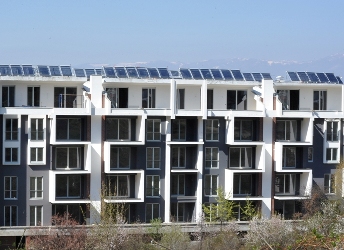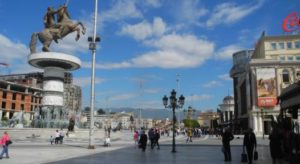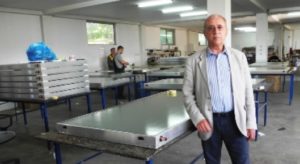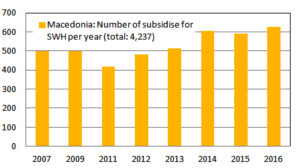Macedonian Government Announces New solar Thermal Subsidy Scheme
July 11, 2012
Apartments in Soravia
 The Former Yugoslav Republic of Macedonia (FYROM) is one of the candidate countries for the European Union (EU) since 2005. Becoming part of the EU means having to bring Macedonia’s laws into line with the “EU Acquis Communautaire”, the rights and obligations shared by all EU countries. With regard to the energy sector, it means that Macedonia has to adopt the European directives on renewable energy and promote solar thermal energy. The current incentive programme for purchasing and installing solar collector systems in households ended at the beginning of June this year. Macedonia’s Minister of Economy, Valon Saraqini, has already announced that there would be a new governmental subsidy scheme for solar thermal energy starting in September. The programme’s budget may even be partly funded by the EU. Details, however, are still sketchy. The photo shows a residential apartment complex in Skopje with solar installations from the Macedonian collector manufacturer Camel Solar.
The Former Yugoslav Republic of Macedonia (FYROM) is one of the candidate countries for the European Union (EU) since 2005. Becoming part of the EU means having to bring Macedonia’s laws into line with the “EU Acquis Communautaire”, the rights and obligations shared by all EU countries. With regard to the energy sector, it means that Macedonia has to adopt the European directives on renewable energy and promote solar thermal energy. The current incentive programme for purchasing and installing solar collector systems in households ended at the beginning of June this year. Macedonia’s Minister of Economy, Valon Saraqini, has already announced that there would be a new governmental subsidy scheme for solar thermal energy starting in September. The programme’s budget may even be partly funded by the EU. Details, however, are still sketchy. The photo shows a residential apartment complex in Skopje with solar installations from the Macedonian collector manufacturer Camel Solar.
Photo: Camel Solar
The Macedonian government’s “Strategy for Energy Development 2030” (see the attached document) includes enacting a new energy law and drawing up action plans for energy efficiency and renewable energies. According to the country’s energy strategy, the share of renewable energies is planned to cover 21% of the total energy consumption in the long run. “Currently, renewable energy sources are our number one priority and I expect the FYR Macedonia to achieve the aims set,” Saraqini said at the 20-year celebrations of the Macedonian Energy Association (ZEMAK) on 8 June.
It was the fourth time after 2008, 2009 and 2011 that the Macedonian government implemented its “Programme to cover part of the expenses for purchasing and installing solar collector systems in households” between February and the end of May. Until 31 May, an uncomplicated application procedure allowed Macedonian citizens to apply for state subsidies amounting to 30% of the solar thermal system costs, capped at EUR 300. The price for a pumped solar thermal system – including a 200 litre tank, but without installation – is about EUR 1,000.
The government allocated Macedonian Denar (MKD) 6 million (ca. EUR 96,000) from the state budget to the incentive programme in 2012. Applicants had to fill out a form to participate. 480 of them were later picked out of a total of 2,018 valid applications during a public drawing on 9 June. The lucky winners can now buy and install solar thermal collectors on their homes and submit their invoices to the Ministry of Economy to receive the grants.
According to data by the Macedonian Ministry of Economy, 20,000 Macedonian households have already used solar thermal for heating and cooling. During its previous incentive programmes, the ministry supported 1,420 households in installing solar thermal systems and paid nearly MKD 21.9 million (EUR 350,000) out of the state budget. If all of the about 600,000 households in FYROM installed solar thermal collectors on their homes, it could save up to 144,000 MWh of energy or MKD 5.4 billion, ministerial data shows.
On 19 May, Minister Saraqini paid a visit to the family of Violeta Surmean in Skopje. Surmean has already profited from one of the previous incentive schemes.
“One solar collector system costs EUR 1,000,” Surmean told the Minister. “We installed three solar collectors with boilers on all three floors of my home. Water heating alone would have cost me about MKD 4,000 (EUR 65) per month for electricity during the summer time.” According to Saraqini, a household could save 2,400 kWh or MKD 8,400 (EUR 135) by using solar collectors during eight months of the year.
“Currently, we are negotiating with various banks for so-called green credits, which should also support solar collector installations,” Saraqini announced during the visit to the Surmean family. EU funds could be utilised as well, he added. “In cooperation with the banks, we will start the second phase of our subsidy scheme to support solar collector installations in September. We are thinking about a scheme payment in nine instalments. That means that the households will have to pay about EUR 60 to 70 per month for installing this kind of system,” Saraqini explained.
Macedonian Ministry of Economy: http://www.economy.gov.mk
Macedonian Energy Association: http://zemak.mk


